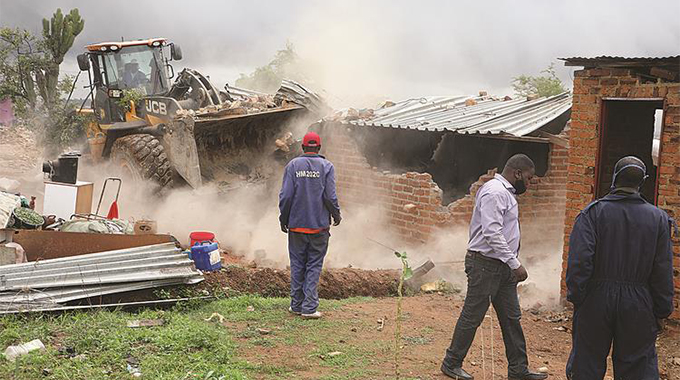Editorial Comment: Demolitions: Council must act in time

The destruction of almost 200 illegally-built houses in the middle of the rainy season on a school site in Budiriro by Harare City Council workers implementing a court order stresses yet again the need for the council to act in the early stages of illegal building, rather than delay and delay and hope for the best.
The Government has stepped in, and without defying a court order, has removed the inhumane inanity of smashing down houses while it is raining, but the main fault is with the council for not moving right at the beginning and preventing the houses being built in the first place.
It is possible. You do not have to wait for a final order. The council could have got an interdict preventing anyone from building without an approved layout plan or approved building plans right at the start, when foundations were being dug, or have gone for the spoliation order, restoring occupancy to the presumed legal owner, the city council, while the title dispute was sorted out in a final order.
But this would require the council to have recognised illegal building before work had proceeded beyond the foundation stages and then moved fast. Just because the council eventually went to court and won does not mean it was efficient or doing its job.
We all know one underlying problem.
Land barons — corrupt cooperatives, council or political officials — create illegal stands on State or council land, or demarcate stands legally, but never service the area as they are supposed to, and then sell these with almost zero paperwork telling the buyers not to worry, that everything has been fixed and the planning and services will be “regularised” later.
So the buyers take a risk and start building, most of them without an approved building plan, and without the inspections, including the final one certifying the house as fit for human habitation.
The Government has now made it clear that regularisation is only potentially possible if there was an approved layout plan, but work started too early. Development on wetlands, school sites, playing fields and the like can never be regularised.
The council took the necessary legal action to get a court order certifying that the stands were not legally created or sold, that the land still belongs to the council, and that the council is permitted to evict those who are legally trespassing and demolish their structures if the builders have not done so already. But why wait two years for a final order?
The best time to stop anyone building is before any building starts, but since no one tells the council what they are doing in advance in most of these cases, the practical time to stop anyone building is when workers with shovels are starting to dig the foundations.
This, of course, requires council officials to be keeping an eye on their city or town, rather than sitting in offices supporting the tea growers of the Eastern Highlands, knowing what areas have been approved for development, and checking on every new building site. Even for approved development, someone should be checking that the building plans have been approved.
This used to be routine. Even if you were having a simple pre-cast concrete wall erected, let alone something more complex, some officious official would turn up, flash their ID and ask to see the permit. The foreperson of the gang putting up the wall would almost instantly dig out the certified copy, which would be carefully examined. Everyone, from council official to property owner to contractor, expected the system to work perfectly although “we just have to check”.
But if there was some problem then there was an order to cease work and an instruction to get all the required paperwork done and approved. If necessary the courts would be asked for an urgent temporary orders, freezing development for everyone, while the civil suit on ownership wound its way through the courts.
It worked. To take one major example, the development of the late Mr Sam Levy in Borrowdale, on land he had bought and held clear title for. He started by demolishing small structures on a small area at the top end of the Highlands planning area already zoned for commerce. But he altered building plans during construction, and was stopped until he had the new plans approved.
He then extended construction into the Borrowdale planning area, on land zoned purely for residential purposes. He was stopped. In the end Mr Levy submitted, found a professional to draw up a new local plan, shelled out for the sewer extension, and regularised his building plans putting in the required extra parking areas.
A final dispute occurred over an office park. Again he was prevented from occupying the office blocks until all paperwork was complete. He sighed, found his political pals could not really help through influence or changing the law, submitted, and went through the processes he should have followed from the start. In those days even a wealthy, impatient, hard-driven and well-connected person had to follow rules. Or else: the bulldozers would arrive.
And it is this attitude and these practices we need back at our city council.
If all this had been in place in early 2018 in Budiriro, as soon as the illegal creation and sale of stands on council land was discovered by a competent council official, building would be stopped, administratively or by court order, before there was anything to demolish. And by now the twin civil suits would be complete. One, by the council, would have confirmed its title to the land and debunked the lies peddled by cooperative officials; the other would have seen those same officials forced to refund the purchase prices for the fake stands.
With luck the criminal trials of the land barons would be complete, and the courts do generally offer to suspend a chunk of a jail sentence in fraud and fraud and theft cases if the criminal gives back the cash, a free opening for those who were conned.
The stand buyers would still, admittedly, have no house of their own yet, but they would be wiser and still have their money to buy into a legitimate scheme; their only loss would be a couple of years wasted.
But this requires a competent local authority, one that keeps its finger on every pulse and is ready to take action promptly, efficiently and legally to enforce its own and national planning and building rules, rather than lining its own pockets.
Such a council would also, of course, be repairing potholes on side roads, making sure everyone received water 24 hours a day, or had a fair and rational rationing scheme if this was fundamentally impossible, and would collect garbage on time. And it would possibly not have its present mayor, his immediate predecessor and its deputy mayor on remand, facing corruption-related charges.
We live in hope.








Comments